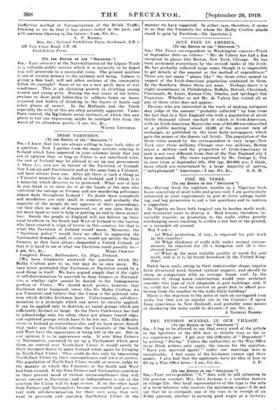. IRISH PARTITION.
[To THE EDITOR OF THE " SPECTATOR."] SIR,—I know that you are always willing to hear both sides of a question. Now I gather from the many articles relating to Ireland which have appeared in your columns lately that you are of opinion that, so long as Ulster is not interfered with, the rest of Ireland may be allowed to set- up any government it likes, i.e„ you are in favour of the Partition of Ireland. tiow I am an anti-Partitionist and at the same time a Unionist, and have always been one. After all there is such a thing as s Unionist minority in the South of Ireland, and I think it is a minority which deserves to be protected. What sort of fate io you think is in store for it at the hands of the men who contrived the outrage at Fermoy and are murdering policemen almost daily throughout Ireland ? No doubt these scoundrels and murderers are only small in number, and probably the majority of the people do not approve of their proceedings, but they show no sign of disapproval, or, at any rate, they do not move hand or foot to help in putting an end to these atroci- ties. Surely the people of England will not deliver up their loyal brethren in the South and West of Ireland to the faction who have created a reign of terror in this country, for that is what the Partition of Ireland would mean. - Moreover, the " Partition policy!' would have no effect in appeasing the Nationalist demands, and, of course, would not satisfy the Sinn Feiners, as they have always demanded a United Ireland, so that it is hard to see of what use Partition could possibly he.— [We have frequently answered the question which Sir Malby Crofton puts to us, but may do go once more. We have never pretended that Exclusion or Partition would be a good thing in itself. We have argued simply that if the right of self-determination be asserted by Sinn Feiners or National- ists, a similar right cannot be denied to the homogeneous portion of Ulster. We should much prefer, however, that Exclusion never happened, since, like Sir Malby Crofton, we are Unionists and believe that the Union is the political solu- tion which divides Irishmen least. Unfoitunately, self-deter- mination is a principle which can never lie strictly applied. It can be applied only to districts or racial groups which are sufficiently distinct or large. As the Paris Conference has had to acknowledge only too often, there are always frayed edges and scattered groups which have to be left out. This difficulty exists in Ireland as everywhere else, and we have never denied (lint under any Partition scheme the Unionists of the South and West have the appearance of being left in the air. But in our opinion it is in appearance only. If ever' Sinn Feiners or Nationalists consented to set up a Parliament which gave them no control over North-East Ulster it would surely be their foremost desire to make Ireland whole again by bringing in North-East Ulster. They could do this only by impressing North-East Ulster by their reasonableness and sense of justice. The population of North-East Ulster would, of course,. judge by the manner in which the Unionists of the South and West had been treated. If the Sinn Feiners and Nationalists continue in their present mood of furious unreasonableness they will never consent to Partition; and as independence is out of the question the Union will be kept secure. If on the other hand Sinn Feiners and Nationalists become reasonable and are con- tent with self-determination for their own area, they will want to persuade and conViiice North-East Ulster in the manner we have suggested. In either case, therefore, it seems to us that the Unionists for whom Sir Malby Crofton pleads stand to gain by Partition.—En. Spectator.]






































 Previous page
Previous page